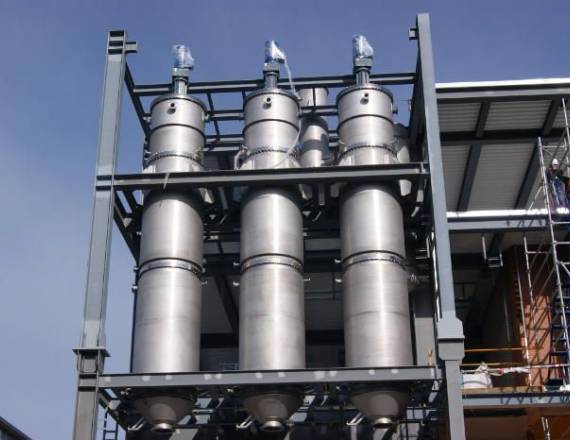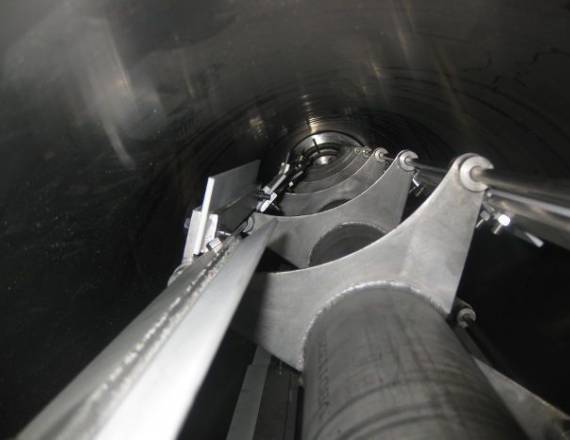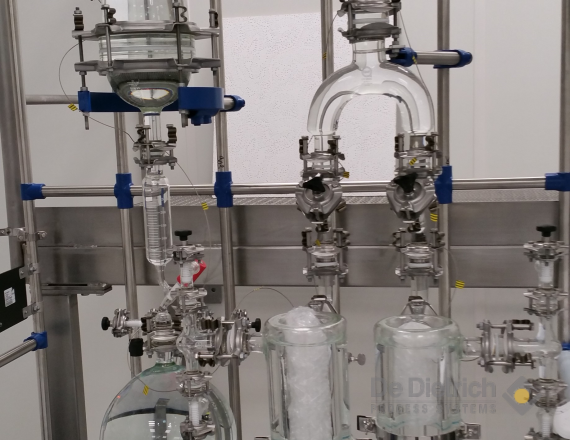Thin Film Evaporator
- Low evaporation temperature -
- Short residence time -
- High evaporation rate -



General Process Description
Thin-film or thin-layer evaporators have been developed to purify temperatures sensitive products by evaporation. The temperature sensitive product can be both the high and the low boiling component in the mixture. The target was to operate at low evaporation temperatures means low vacuum and to minimize the residence time of the product in the evaporator. In order to reduce the evaporation temperature at the heated evaporation surface as far as possible the pressure incl. the hydrostatic pressure due to the liquid product itself should be minimized.
The solution is a thin film of the liquid product on the inner side of a vertical evaporation pipe which is generated by a rotating wiper system.
The rotating wiper equally distributes the down flowing liquid feed on the inner side of the wall. The film is about 0,1 to 0,5mm thick depending on the viscosity of the liquid, type of wiper system, rotating speed and liquid throughput. This thin film provides almost no hydrostatic pressure, minimum hold-up and almost no temperature and concentration gradient due to the good radial mixing performance. This provides highest evaporation rates means shortest residence time in the evaporator at lowest temperatures permitting the production of high quality temperature sensitive products. The vapors are mostly guided upwards in a counter current manner to a down coming condenser.
De Dietrich Process Systems is able to provide you with a wide range of thin film evaporators made of Stainless Steel, Alloy, Borosilicate Glass or Glass-Lined Steel.
Main applications are: Methyl ester evaporation, Glycerine evaporation, Lecithine drying, pharmaceutical intermediates concentration, solvent stripping in polymer industry (isocyanates, cyanoacrilates, etc.)
A typical flow chart of a pilot plant like system can be seen below:
- E1 Thin film evaporator
- E2 Condenser
- E3 Optional feed pre-heater
- E4 Optional cold trap
- P1 Feed pump
- P2 Vacuum pump
- B1 Intermediate receiver for high boiling component
- B1a Final receiver for high boiling component
- B2 Intermediate receiver for low boiling component
- B2a Final receiver for low boiling component
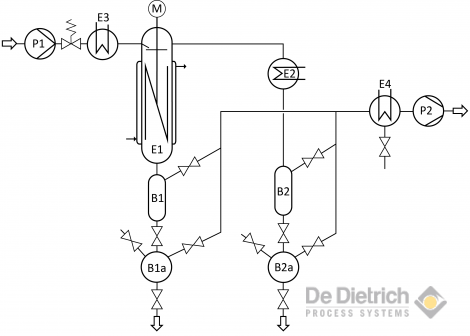
Empty line to generate FULL WIDTH
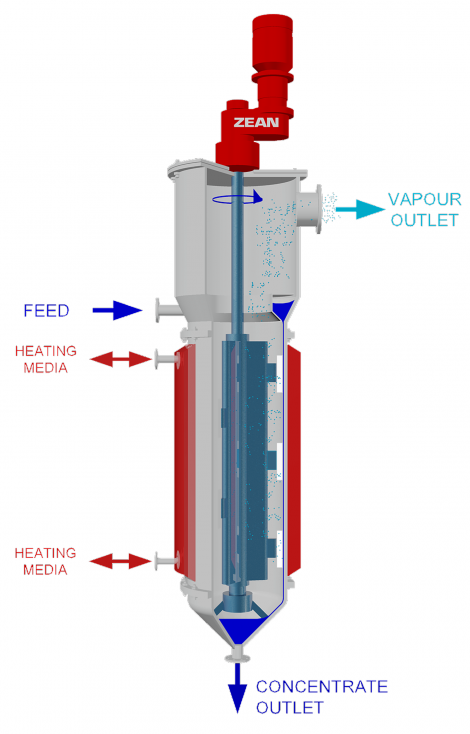
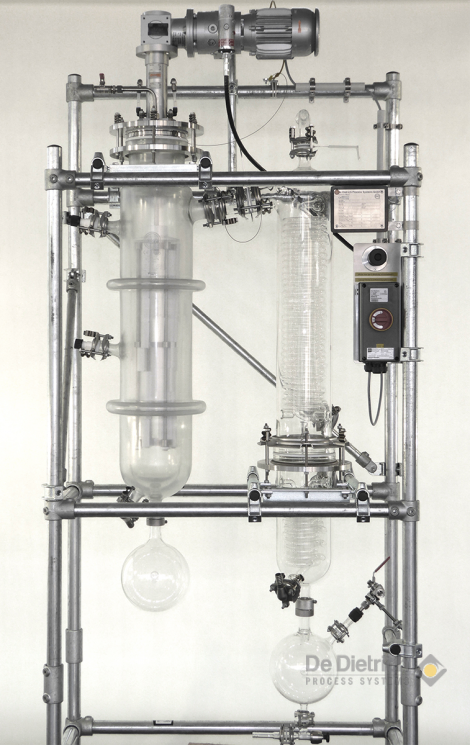
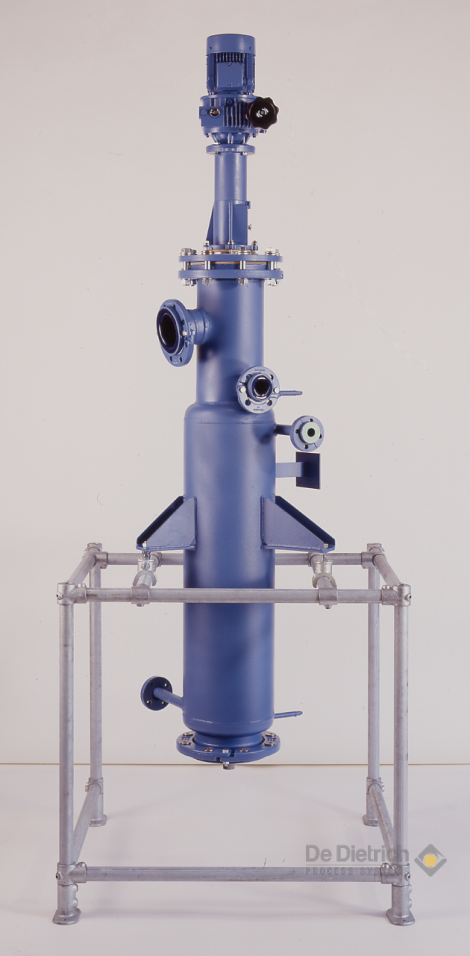
Technical Description
The thin film evaporators of De Dietrich Process Systems are made of highly corrosion resistant QVF® borosilicate glass 3.3 or De Dietrich® glass-lined steel both providing an extremely smooth surface reducing the risk of material sticking to and hence remaining and degrading on the hot evaporation surface. The transparent borosilicate glass enables on optimum adjustment of the rotating speed while observing the inner surface of the evaporator.As drive for the wiper system the proven stirrer drives with single/double mechanical or magnetic seal from our range for reactors are used providing a reliable long-term vacuum tight operation.
Thin film evaporators are provided in different sizes depending on the material of construction:
- Borosilicate glass 3.3 : DN40 with 0,04m² up to DN300 with 1m² heat exchange surface
- Glass-lined steel: DN150 with 0,2m² up to DN600 with 3m² heat exchange surface
Operating Temperatures
The evaporators can be heated with thermo-oil or steam. The maximum permissible temperature on the inside of the evaporators is set by the material and construction of the wiper system developed by us.
Maximum temperature in the evaporator depend on the kind of the wall wipers:
- Wall wipers with PTFE elements: 150°C
- Fully metallic wall wipers: 200°C
We provide different wiper systems to cope with different most challenging varying requirements:
- Corrosion resistance
- Temperature resistance
- Viscosity of the liquid product
- Presence of solids
Maximum temperature in the heating jacket made of borosilicate glass 3.3 or glass-lined steel: 200°C
Evaporation rates
The maximum evaporation rates per heat transfer area depend mainly on the heat conductivity of the material of the evaporator and the maximum temperature difference between the boiling point and the temperature of heating jacket. As an orientation, evaporators made of borosilicate glass 3.3 DN300 with 1m² heat transfer area permit the evaporation of up to 80kg/h of organic solvents.
ADVANTAGES
- Our thin film evaporators are available Stainless Steel, Alloy, Borosilicate Glass and Glass-Lined
- Huge experience in evaporators technology since Zean's acquisition
- Perfectly adapted to a multitude of evaporation processes.
- High evaporation rates.
- Able to handle highly viscous products with or without solids.
- Avoid foaming.
- Low residence time – Minimal residence time.
- Vacuum distillation of up to 1 mbar.
For more details on Thin Film Evaporators made by Zean click here
Highlights
- - Short residence time avoiding thermal degradation-
- - Low evaporation temperatures avoiding thermal degradation -
- - High evaporation rates for high throughputs -
- - Fully corrosion resistant for universal use -
- - Smooth evaporation surface for easy cleaning -
- - Reliable long lasting drives -
- - Certified tightness of the flange connection for low vacuum and avoidance of oxygen -
- - Oberservation of the process when using borosilicate glass 3.3 as material of construction -
